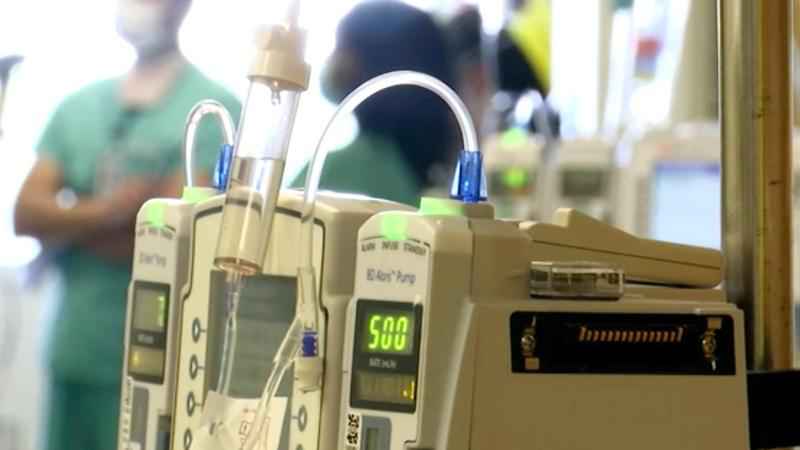Research analysis sheds light on lingering symptoms among COVID-19 long-haulers
[anvplayer video=”5050520″ station=”998122″]
A review of COVID-19 patients across multiple countries sheds new light on lingering "long-hauler" side effects of the virus.
The meta-analysis published in Scientific Reports last week analyzed more than 18,000 publications, focusing on data from 15 studies. The report included nearly 48,000 patients across the U.S., Europe, the U.K., Australia, China, Egypt and Mexico.
The authors estimated 80% of patients infected with COVID-19 develop one or more long-term symptoms.
They identified 55 long-term effects associated with the virus, from persistent coughing to chest pain to paranoia.
The most common lingering symptoms were fatigue (58%), headaches (44%), attention disorders (27%), hair loss (25%) and difficulty breathing (24%).

Medical devices are seen at Ochsner Medical Center in the New Orleans suburb of Jefferson, La., on Tuesday, Aug.11, 2021. The rapidly escalating surge in COVID-19 infections is once again overwhelming hospitals across the U.S. That is especially true in hot spots such as Louisiana, which is hitting record numbers of coronavirus hospitalizations, driven by the highly infectious delta variant and the state's low vaccination rates. [Stacey Plaisance/Associated Press]
The report states: "Multi-disciplinary teams are crucial to developing preventive measures, rehabilitation techniques, and clinical management strategies with whole-patient perspectives designed to address long COVID-19 care."
Minnesota patients experiencing COVID-19 long-hauler symptoms told 5 EYEWITNESS NEWS it is validating to see new data on this mysterious condition.
"I forget almost everything. I have to make notes for almost everything," said Jessica Bullock of Maple Grove. "I struggle to find words, which is not like me."
Bullock said she contracted COVID-19 in May 2020. Now, 15 months later, she is still dealing with memory loss, intense muscle aches and vision problems, including eye fatigue.
"I just am learning to live with it and I think that’s probably the new norm for me," Bullock said.
Several clinics have opened in Minnesota over the last year, specializing in post-COVID-19 care.
Mayo Clinic said their COVID-19 Activity Rehabilitation Program, or CARP, was one of the first multidisciplinary programs established to evaluate and treat patients with post-COVID-19 syndrome.
CARP started seeing patients in April 2020 and formalized its program in June 2020.
"Through the past year, we have seen some certain trends. For example, fatigue tends to be the most prevalent symptom," said Dr. Greg Vanichkachorn, an occupational medicine specialist who is the medical director of CARP.
Dr. Vanichkachorn said the program has seen more than 500 patients in the last year.
"There seems to be two groups of patients. There is a first group that tends to get better four to six months out after their acute infection. After that, there is a longer group of patients that can have lingering symptoms for even up to a year or more," Vanichkachorn said.
He said research led by Mayo Clinic surrounding long-haulers found more than one-third of patients reported difficulties performing basic activities of daily living.
He said the new analysis in Scientific Reports helps clarify what patients continue to deal with after initially recovering from COVID-19.
"The study is an important step forward and sheds more light on the plight of this condition," Vanichkachorn said.
He said his firsthand experience with patients in Minnesota has also led to a greater understanding of how to help them.
"There are two important things we have learned since starting to treat this condition. One is that it’s really possible for patients to overdo their activity early on. That’s where patients will often cause a lot of stress on their body and have setbacks," Vanichkachorn said.
"What we recommend here at Mayo Clinic is what’s called a ‘paced activity approach,’ where patients will slowly increase their activity over time and not stress their bodies too much. The second thing is we have seen this to be more of a neurological condition than we originally anticipated, so meeting with a neurologist to discuss things such as headaches or trouble with hearing or weird sensations in your body, those are important avenues to investigate."
Long-haulers like Bullock have lingering questions about their lingering symptoms.
"Did it damage us? Is it permanent? Will it get better?" Bullock said. "My hope is it will get better and it won’t be like this forever."
Dr. Vanichkachorn said the research at Mayo Clinic continues as they aim to learn more about what is happening on a chemical level inside patients’ bodies so they can provide additional treatment options.
If you are experiencing long-hauler symptoms of COVID-19 and would like to seek help from Mayo Clinic’s COVID-19 Activity Rehabilitation Program, call Mayo Clinic Occupational Medicine at 507-284-4340 for more information.